Chapter 8 Persistent Optimism under Political Uncertainty
Proposal review
The Evolution of Citizens’ Election Projections During a Protracted Political Crisis
Author(s)
Tenenboim-Weinblatt, Keren
Baden, Christian
Aharoni, Tali
Overbeck, Maximilian
Collection
European Research Council (ERC); EU collectionLanguage
EnglishAbstract
This chapter examines the social dynamics of projections about the outcomes and implications of the repeated elections in Israel. Based on a combination of a panel survey and focus groups, we analyze citizens’ evolving predictions regarding the expected largest party, the next prime minister, the coalition composition, and the future of Israel more generally. Introducing a conceptual framework that breaks political projections into several constituent elements, we study what probabilities and evaluations people assign to their predictions, how they explain them, and what their implications are for political participation. We show that despite the deepening political crisis, Israeli citizens’ political optimism did not decrease during the three 2019–2020 election campaigns. Furthermore, we find an important link between intention to vote and the expected level of happiness about the predicted outcomes. Based on these findings, we argue that persistent optimism is one explanation for the higher voter turnout in each round of elections. In the epilogue we consider additional insights from the 2021 election, which saw a reversal in voters’ growing optimism and turnout, but which eventually fulfilled hopes of the anti-Netanyahu camp for political change.
Keywords
Elections; Israel; King Bibi; Netanyahu; populism; democracyDOI
10.4324/ 9781003267911-11ISBN
9781032213392, 9781032213408, 9781003267911Publisher
Taylor & FrancisPublisher website
https://taylorandfrancis.com/Publication date and place
2022Grantor
Imprint
RoutledgeClassification
Regional / International studies


 Download
Download